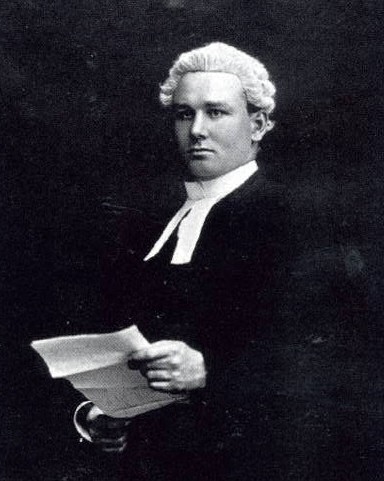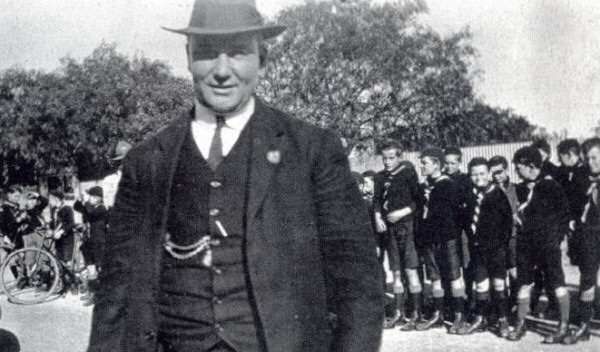| |
 |
| |
Elliott, Harold ‘Pompey’
Harold ‘Pompey’ Elliott was Australia’s foremost fighting general on the Western Front during the Great War. He was born in 1878 into a migrant English family that lived on a modest farm near Carlton, the next town along from Weddeburn in the north west of Victoria. Harold Elliott was a bright student, but his family’s poverty was likely to have constrained his opportunities. When his father struck gold on the Western Australian gold fields, it changed his son’s life as well. The family moved to a fine mansion in Ballarat. ‘Pompey’ duxed Ballarat College, studied law, and was one of the biggest young men in the Ormond College Australian Rules football club. His brother George studied medicine.

Source: Ross McMullin, Pompey Elliott (Scribe)
Pompey Elliott (centre in back row) as a footballer in the Ormond College team at Melbourne University.
Elliott received his nickname ‘Pompey’ due to his resemblance to a popular footballer at the time who was called ‘Pompey.’ When the Boer War broke out, Pompey volunteered for service and as a Lance-Corporal planned and personally executed a raid on the camp of an outstanding Boer commander that resulted in his capture. Elliott was awarded the Distinguished Conduct Medal.

Source: Ross McMullin, Pompey Elliott (Scribe)
Pompey Elliott as a young lawyer.
When he returned from South Africa, Elliott completed his law degree and went into private practice. He maintained his interest in the Citizen’s Military Force, where he gained a commission, and juggled this with his career and family life. He and his wife Kate had two children, Violet and Neil, who was only a few years old when World War I broke out. Lieutenant-Colonel Elliott departed Melbourne in command of the 7th Battalion, which incorporated his pre-war unit, the Essendon Rifles.

Source: Ross McMullin, Pompey Elliott (Scribe)
Lt. Col. Pompey Elliott with his wife Kate, son Neil (filling dad’s boots) and daughter Violet at the Broadmeadows Camp north of Melbourne late in 1914 (prior to departure).
Elliott had a bad first day at Gallipoli, when he was shot in the ankle as he made his way up a hill. While convalescing in Egypt, his 7th Battalion was sacrificed at the Battle of Krithia. On his return, Elliott rebuilt the battalion, which distinguished itself in holding Lone Pine in the face of a very determined Turkish counter-attack. Elliott’s bravery, and blustering leadership style earned him the undying devotion of his men.
On the Western Front, Elliott was promoted to Brigadier General, and distinguished himself at the Battle of Polygon Wood, where the British General Sir Herbert Plumer thanked him for saving his Second Army. Then at Villiers-Brettonneux, he devised a brilliant ‘pincer-movement’ counter-attack on the town that resulted in the capture of many German prisoners. While it was described as the most brilliant attack of the war by the French president, Elliott was not promoted to Major-General, as he had failed to ‘manage up.’ His sometimes erratic behaviour and his personality clash with the Anzac commander, Lieutenant General Sir William Birdwood, blocked his promotional opportunities.

Source: Ross McMullin, Pompey Elliott (Scribe)
As a senator, Pompey Elliott took a keen interest in the scouting movement.
By the time he returned from the Great War, Elliott’s law practice had been squandered by his former partner. However, ‘Pompey’ Elliott’s popularity as a war hero was so great, that in 1919 he was elected to the Australian Senate as a Nationalist Party senator. Pompey’s time in the senate was punctuated by several controversies, including the 1921 debate that embroiled the name of Albert Jacka, as one who had suffered discrimination within the army ranks. The Elliott’s purchased a house at 56 Prospect Hill Road, Camberwell, and although Elliott’s wealth increased through the 1920s, the Great Depression and continued bitterness over his supersession during the war demoralised him to the extent that in 1931 he committed suicide while he was being treated at a private hospital.


Source: Ross McMullin, Pompey Elliott (Scribe)
Pompey Elliott’s house in Camberwell.
|
|
Copyright © 2010 Michael Lawriwsky
|
|